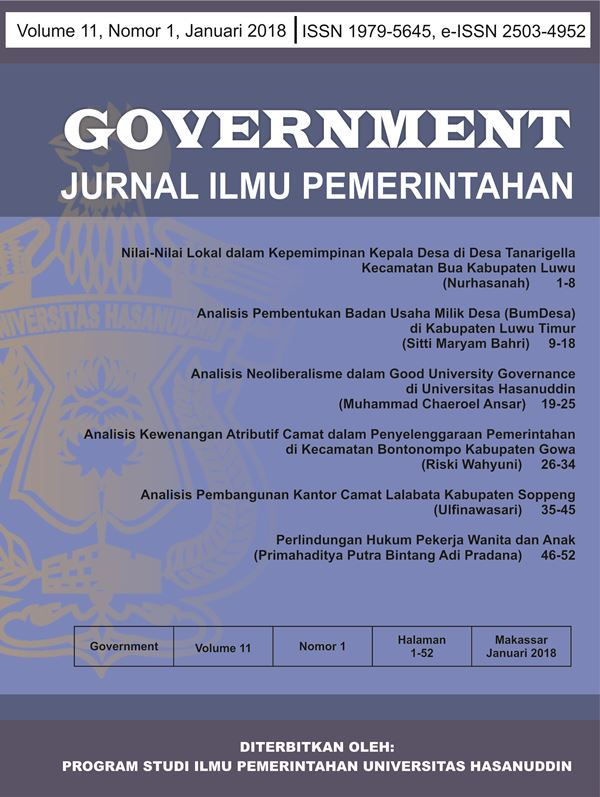Analisis Kewenangan Atributif Camat dalam Penyelenggaraan Pemerintahan di Kecamatan Bontonompo Kabupaten Gowa
DOI:
https://doi.org/10.31947/jgov.v11i1.8023Keywords:
attributive authority, community empowerment, local governmentAbstract
This research aims to determine the implementation attribute authority of the Subdistrict Head in the community empowerment activities in the Subdistrict Bontonompo of the Regency Gowa and the factors that influence. To achieve that goal, used method of research qualitative with parse the data is descriptive. The technique collection of the data by observation, interview, as well as document and archives by using technical analysis descriptive qualitative.The result of the research showed: First, impelementation attribute authorityof the Subdistrict Head in the implementation of government in the Subdistrict Bontonompo of the Regency Gowa can be said good enough and is based on the national legislation. But in the implementation there are indicators are not maximal yet, as like encourage public pastisipation in the Musrembang forum. Second, the factor that influence implementation attribute authority of the Subdistric Head in the Subdistrict Bontonompo of the Regency Gowa include the factor inhibiting and supporters. The factors inhibiting are limitedness budget and the lack of capabilities of human resources. The factors that be supporting are leadership of Subdistrict Head and Government policyDownloads
References
Billah, MM. (1996). “Good Governance dan Kontrol Sosial”, dalam Prisma No. 8. Jakarta: LP3ES.
Dharmawan, Arya. (2008). Kelembagaan dan Tata Pemerintahan Kecamatan. Bo-gor: Project Working Paper No. 07.
Dharmawan, A. (2008). Kelembagaan dan Tata Pemerintahan Kecamatan, Bo-gor: Project Working Paper.
Karim, A. Gaffar. (2006). Kompleksitas Perso-alan Otonomi Daerah diIndonesia, Yogyakarta:Pustaka Pelajar.
Mardikanto, dkk. (2015). Pemberdayaan Masyarakat dalam Perspektif Ke-bijakan Publik. Bandung: Alfabeta.
Mustafa, D. (2014). Birokrasi pemerintahan, Bandung: Alfabeta.
Ndraha T. (2003). Kybernologi (Ilmu Pemerintahan Baru), Jakarta: PT. RinekaCipta.
Sarundajang, (2002). Arus Balik Kekuasaan dari Pusat ke Daerah, Jakarta: Pustaka Sinar Harapan.
Sugiyono, (2015). Metode Penelitian Kuanti-tatif Kualitatif dan R&D, Bandung: Alfabeta.
Syafiie, Inu, (2013). Ilmu Pemerintahan (edisi revisi kedua), Bandung: CV.Mandar Maju.
Kinseng, R.A., (2008). Kelembagaan dan Tata Pemerintahan Kecamatan. Project Working Paper No. 03, Bogor.
Labolo, M. (2008). Memahami Ilmu Pemerintahan. Jakarta: PT Raja Grafindo Persada.
Kamus Besar Bahasa Indonesia, Cetakan Per-tama Edisi III, Jakarta:
Syakrani. S, (2009). Implementasi Otonomi Daerah dalam Prespektif Good Gov-ernance, Yogyakarta: Pustaka Pelajar.
Wasistiono, dkk, (2009). Perkembangan Or-ganisasi Kecamatan Dari Masa ke Masa, Bandung: Fokus Media.
Widjaja, H. (2002). Otonomi Daerah dan Dae-rah otonom. Jakarta: PT Raja Grafindo Persada.
Kertapradja, E. Koswara, Peranan dan Kedudukan Camat dalam Sistem Pemerintahan Negara Kesatuan Re-publik Indonesia, Makalah disam-paikan sebagai bahan Diskusi pada Fo-rum Democratic Reform Support Pro-gram (DRSP), 5 November 2007;
Razikin,(2009).Implementasi Pelimpahan Wewenang Walikota Kepada Camat Di Kantor Kecamatan Tanjungpinang Barat Kota Tanjungpinang (Studi Ter-hadap Surat Keputusan Walikota No-mor 675 Tahun 2009), e-Jurnal, Fisip Universitas Maritim Raja Ali Ha

